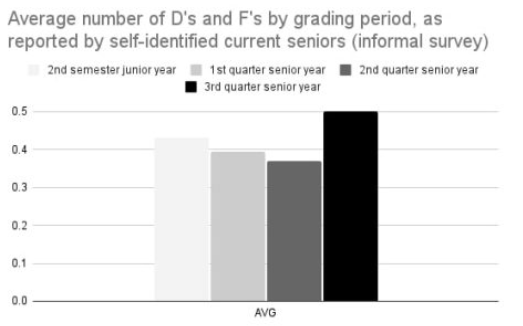
Ever felt like you do something else other than school work like thoughts of “I’ll do it later” or “This is my senior year, I can afford a low grade this year”? Well, you are not alone as many seniors and even college students can get this plague. Although not a real disease that can harm you physically, it can however affect how you perform in school through ways such as bad grades which would lead to no college, redoing your senior year, and worst of all your friends who passed moving on in life while you stay in school. Senioritis is a loss of motivation during your last years in school and it can happen for a variety of reasons. The Origins of the word senioritis date back to 1907 when the boom of the 20th century provided more education as a means of keeping people knowledgeable enough to vote/work jobs. Now that education is much easier to access it does raise the standards for living as you must perform just as well as others in schools. This creates a bubble of uncertainty and overconfidence from which senioritis is born and is why most students who get senioritis have no turning back as it is the final year that may determine the next step in life. Most students haven’t heard of senioritis even if they have symptoms, so we’ll dive deeper into student’s worst fear of dropping out of school and working a dead-end job for the rest of their lives.

Senioritis has been shown to have dramatic changes in one’s grade and performance as it can lead to Seniors getting rejected from colleges even if they have been accepted. According to CollegeBoard, “Colleges may reserve the right to deny admission to an accepted applicant should the student’s senior-year grades drop”. These colleges indeed have the right to do this as it encourages competitiveness in schools whereas if they let someone with senioritis in just because they had good grades last year it would probably transfer over to the college schools and they’ll lose reputation and money. Universities adopting these changes says a lot since schools always want to maintain their graduation rates high and if it was plagued by senioritis college students it would cause graduation rates to drop. Thus seniors must maintain their grades so the excuse “I can afford a low grade” will not work for colleges as they monitor a student’s performance and know when a student has dropped because of senioritis. This may sound like a personal problem but many students face senioritis every senior year according to a survey study done by the WashBurnReview, around the 3rd quarter of senior year sees an increase in D’s and F’s in the grading period from students which is the highest behind junior year at around 0.4 average. To put it into context for every junior in a class of 30 and 7 are failing you double that and become 14 fails out of a class of 30 seniors. We must understand why senioritis is so serious and how it can not only us but also our school’s reputation as most people would blame the schools when in reality it was the student at fault. So students with senioritis will most likely have to take another year of high school, do extra credit programs, and not get into the college they hoped for regardless of acceptance or not.
Though we may talk about other school’s reports, it does happen here at ELARA where we’ve interviewed a select few seniors for their experience and tips on dealing with senioritis. Our first senior Anthony Garcia said this about his experience “It makes it really hard to focus on school and stuff and when it gets really you want to do anything other than schoolwork”. We asked Carlos Rocha Barragan if he had senioritis, and he said the following “Oh, 100% I definitely feel it in my last year. It really has affected my motivation”. When it came to tips on dealing with both Garcia and Carlos had a similar response of venting but none topped Jose Hernandez who said: “I know it’s hard to give us some of your free time to do some work, but, hey, it is pretty good. Just give us some of your free time. It doesn’t have to be, like, long, but it can be a little”.
Senioritis is very dangerous and we don’t even treat it like it is something worth investing time in as most people think they would get over it. They are wrong as senioritis can affect the young minds of our generation so we must put a stop to this before it affects what future citizens may face as a consequence. For starters, those who don’t plan in school will most likely catch senioritis. Still, even if you are on task with your work you mustn’t become overconfident as that can also lead to senioritis as no discipline can lead to procrastination and then senioritis. Even though senioritis sounds scary, there are some quick tips from Southern New Hamshire University:
- Set goals to get you motivated
- Get yourself organized and on schedule
- Surround yourself with support
- Remember what you’re working toward

